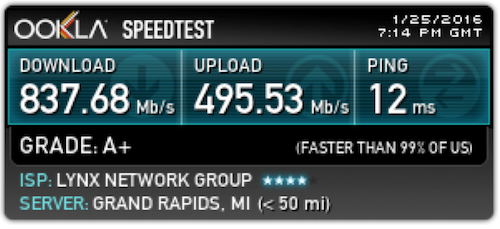
Fast, affordable Internet access for all.

A pilot project in the City of Holland, Michigan is now delivering gigabit speed Internet service via a dark fiber network built by the city more than two decades ago; three commercial buildings are connected. The project, led by the Holland Board of Public Works (HBPW), is the first phase in an effort to develop a municipally owned and operated fiber network.
Holland is home to about 33,500 people and situated on the shores of Lake Michigan. The community is known for its roots in Dutch culture and is a popular summer tourist destination. Windmills and tulips dot the landscape.
Daniel Morrison, the president of a software company in Holland and a member of a local public interest group called Holland Fiber, recognizes that businesses need fast, affordable, reliable connectivity:
“Our whole business is online,” he told the Holland Sentinel newspaper. “We’re working with clients all over the world and we want to be able to work as quickly as possible.”
Morrison’s company is a pilot tester. After the testing program began in January, Morrison Tweeted out a screen grab showing his Internet speeds:

Pretty darn fast.
Toward a Municipal Network?
Pilot testing is set to last for three months to allow Holland’s Board of Public Works (BPW) to test out network technologies and solicit feedback from testers. All of the pilot testers are getting free fiber Internet service during the testing period.
Holland's BPW plans to apply their findings from the test toward a business plan for a municipal network for the entire service area. They will also use the business plan to support an application to the State of Michigan to become an authorized Internet Service Provider. BPW officials expect state regulators to respond to their application by the fall of 2016.
History of Holland’s Fiber Network
Holland first installed a 17 mile, 48-count fiber optic ring in 1992. It successfully facilitated a “smarter” power grid for the city, improving the reliability of various electrical facilities and equipment. In 2003, the city extended the fiber network to most of the school facilities in the local school districts.
Since the mid-1990s, the BPW has also provided limited wholesale Internet services to a small number of businesses that need high capacity data services. After expansion and extension of the network over the years, Holland now has 76 backbone miles of fiber, more than 150 total route miles, and fiber counts of up to 288 strands.
Envisioning a Better Future
Holland was one of the many cities across the country that tried unsuccessfully to lure Google Fiber to their town in 2010. After that disappointment, BPW released a “Broadband Strategic Plan” in 2011 in which they laid out their objectives for providing improved Internet service in Holland. That plan resulted in a recommendation to invest $58 million in a municipal Fiber-to-the-Home (FTTH) network. The Holland City Council never voted to adopt the plan.
Michigan has restrictions, but those state barriers apply when a community decides to invest in municipal Internet network infrastructure as was the case in Sebewaing. In those cases, a community can only build the network themselves if they receive fewer than three qualifying bids. Holland already has fiber in place.
The pilot project is an important step in developing a municipal fiber network in Holland. With the existing infrastructure already in place, the community can assert local authority over the development of a 21st century utility that will benefit the businesses, government services, and residents in this community for years to come.
